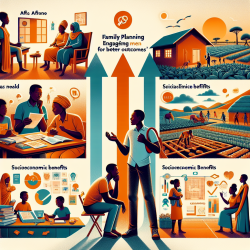Introduction
Family planning programs have made significant strides in sub-Saharan Africa, yet francophone West Africa lags behind. The study "Engaging Men in Family Planning: Perspectives From Married Men in Lomé, Togo" sheds light on the importance of male engagement in family planning, particularly in patriarchal societies. This blog post will explore the key findings of the study and suggest ways practitioners can improve outcomes by involving men in family planning initiatives.
Key Findings
The study conducted in Lomé, Togo, involved 72 married men aged 18-54. It revealed four critical insights:
- Socioeconomic Motivations: Men are driven by socioeconomic reasons to engage in family planning, recognizing the benefits of birth spacing and limiting family size for better resource management.
- Joint Decision-Making: Men disapprove of unilateral decisions by women regarding contraception, emphasizing the need for joint decision-making in family planning.
- Misconceptions: Misunderstandings about modern contraceptive methods can hinder support for family planning. Educating men on the benefits and dispelling myths is crucial.
- Barriers to Engagement: Limited male-controlled methods, insufficient service venues, and a lack of targeted messages create barriers for male involvement in family planning.
Implications for Practitioners
Practitioners can enhance family planning outcomes by addressing the concerns and misconceptions men have about contraceptive methods. Here are some strategies:
- Education and Awareness: Educate men on the socioeconomic and health benefits of family planning. Use community health workers and trusted male figures to disseminate accurate information.
- Inclusive Campaigns: Design family planning campaigns that target men, emphasizing joint decision-making and addressing gender norms.
- Expand Male Methods: Advocate for the development and availability of more male-controlled contraceptive methods to increase male participation.
- Community Engagement: Encourage open communication within families and communities by involving positive deviants—individuals who successfully practice family planning—to share their experiences.
Conclusion
Engaging men in family planning is essential for achieving better health outcomes and gender equality. By understanding men's perspectives and addressing their concerns, practitioners can design more effective family planning programs that include men as active participants. This approach not only benefits families but also supports national goals for increased contraceptive use in francophone West Africa.
To read the original research paper, please follow this link: Engaging Men in Family Planning: Perspectives From Married Men in Lomé, Togo.










